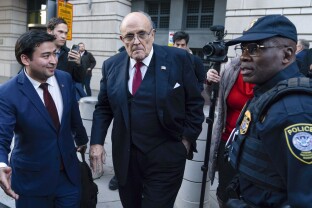When the defendants in Arizona’s fake electors case appeared in Maricopa County Superior Court Tuesday morning, only one was ordered to post a bond to be released: Rudy Giuliani.
This, prosecutors said, was the result of Giuliani evading his summons. Donald Trump’s former lawyer was the last defendant to be served after weeks of avoiding notice of his charges from the Arizona attorney general’s office. He was served on Friday shortly after taunting prosecutors online.
Prosecutor Nicholas Klingerman asked for a $10,000 cash bond and for Giuliani to come to Arizona within 30 days for booking, explaining how difficult it was to serve him.
Giuliani had made “numerous statements aware of the indictment and has failed to reach out or be cooperative in this process,” Klingerman said, citing statements Giuliani made on his podcast and on Newsmax on April 25 and the former again on May 14.
Giuliani argued that a cash bond is “totally punitive” given that other ongoing court cases against him include financial judgments. He also said he thought this indictment was a “complete embarrassment to the American legal system” and that he has always shown up for court hearings. He continued to talk about what he felt was the political nature of the charges before Commissioner Shellie Smith, who was presiding over the case, threatened to mute him.
Smith ordered Giuliani to post a secured appearance bond, noting his financial difficulties. Unlike a cash bond, a secured appearance bond does not have to be paid in full in cash.
Klingerman detailed the attorney general’s office’s attempts to reach Giuliani over nearly a month.
Two days after Giuliani’s April 24 indictment, the office had two special agents in New York who attempted to serve him, he said. Agents called “four different numbers and left four messages” and had not received a callback. Klingerman said the messages included who they were and the nature of their call. Agents “spent about 4-5 hours” outside Giuliani’s New York apartment, he said. They knew he was there because Giuliani did a podcast on April 25 with images of his home identical to those on Zillow. The building’s doorman prevented the agents from entering the building and relayed that he had received a message on April 24 that stated that no one was permitted to enter the building to serve Giuliani. The agents asked if the doorman had a number for Giuliani, and he replied that he did not believe they would be able to reach Giuliani “because frequently the numbers that he provides are inactive.” When the doorman tried to call, no one picked up.
Giuliani said the difficulty reaching him in his building was because of death threats against him and that he has not paid security since his bankruptcy.
He said he had “very, very strict rules about who gets up and who doesn’t.”
The attorney general’s office also sent Giuliani a summons via certified mail on May 2 and have yet to receive confirmation of delivery.
On Friday, the attorney general’s office had two agents waiting to serve Giuliani a summons outside his birthday party in Florida when Giuliani posted a now-deleted tweet stating, “If Arizona authorities can’t find me by tomorrow morning 1. They must dismiss the indictment; 2. They must concede they can’t count votes.”
Approximately an hour later, the agents served him.
Klingerman then entered into the record Giuliani’s Sunday tweet that claimed he had told prosecutors where he would be and “accepted service like a gentleman!” Klingerman said that was false.
“Mr. Giuliani didn’t tell us where he was going to be … Although we served him, it’s, I guess, semantics or whether he accepted service like a gentleman or not, but he has shown no intent to comply with the legal process in Arizona for this case,” Klingerman said.
Klingerman also noted getting a phone call on May 20 from a New York lawyer “not licensed in Arizona and was not representing Mr. Giuliani” asking about appearing online for his arraignment. Klingerman told the lawyer that he had a problem with Giuliani appearing virtually, given “the problems that we’ve had serving Mr. Giuliani a summons and his behavior in this case.”
Giuliani, like two other defendants appearing Tuesday, did not have a lawyer. Unlike the other two, however, Giuliani declined to be appointed court representation and said that he would obtain a lawyer. Smith said that a lawyer would be automatically appointed to him if he didn’t have one by his next court appearance on July 2.
Former Republican state party Chair Kelli Ward and her husband, state Sen. Anthony Kern, and Trump ally Christina Bobb were also in court Tuesday. The defendants face the same charges: one count of conspiracy, two counts related to fraudulent schemes and artifices, and six counts of forgery.
All the defendants pleaded not guilty and waived their right to a reading of the indictments. Every defendant except Giuliani was released on their own recognizance (OR), meaning they were released conditioned on signing an agreement agreeing to appear in court without bail.
—
Tara Kavaler is a NOTUS reporter and an Allbritton Journalism Institute fellow.
Sign in
Log into your free account with your email. Don’t have one?
Check your email for a one-time code.
We sent a 4-digit code to . Enter the pin to confirm your account.
New code will be available in 1:00
Let’s try this again.
We encountered an error with the passcode sent to . Please reenter your email.


